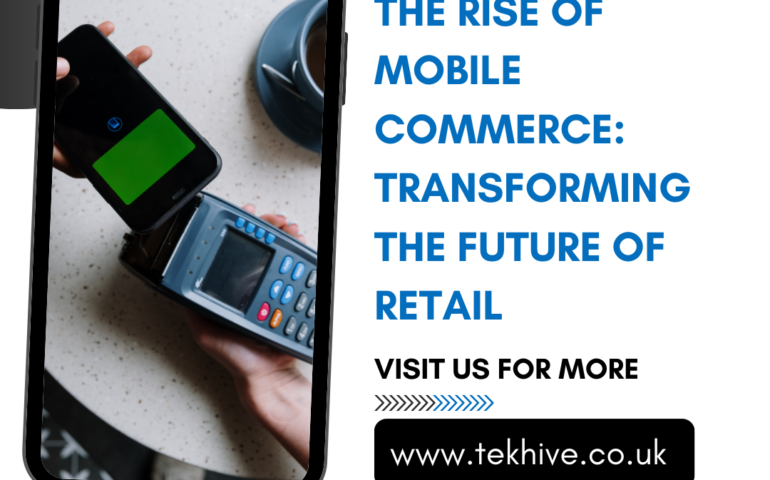
Mobile Commerce

In the digital age, mobile commerce (m-commerce) is rapidly transforming how businesses and consumers interact. With the ubiquity of smartphones and the convenience they offer, m-commerce is becoming a dominant force in the retail industry. This comprehensive guide explores the key trends, benefits, and future prospects of mobile commerce.
What is Mobile Commerce?
Its often abbreviated as m-commerce, refers to the buying and selling of goods and services through mobile devices such as smartphones and tablets. In addition, it encompasses a wide range of transactions, including mobile banking, app-based shopping, and in-store mobile payments. Consequently, m-commerce has become an integral part of our daily lives. For example, the convenience of making purchases on the go has revolutionized the retail industry. Moreover, with the increasing adoption of smartphones, the scope of m-commerce is continuously expanding. Therefore, businesses are constantly innovating to provide seamless mobile shopping experiences. Furthermore, the integration of secure payment gateways has boosted consumer confidence in mobile transactions. As a result, m-commerce is rapidly growing and reshaping the future of retail and banking.
Key Trends
- Growth of Mobile Shopping Apps: The increasing popularity of shopping apps is a significant trend in m-commerce. Retailers are investing in user-friendly mobile apps to enhance the shopping experience and drive sales.
- Mobile Wallets and Contactless Payments: Mobile wallets like Apple Pay, Google Wallet, and Samsung Pay are making transactions seamless and secure. Contactless payments are becoming the norm, especially post-pandemic.
- Augmented Reality (AR) Integration: AR technology is enhancing the mobile shopping experience by allowing customers to visualize products in their real environment before making a purchase.
- Social Commerce: Social media platforms like Instagram and Facebook are integrating shopping features, enabling users to purchase products directly through these apps.
- Personalized Shopping Experiences: AI and machine learning are being used to provide personalized recommendations, enhancing customer satisfaction and loyalty.
Benefits of Mobile-Commerce
- Convenience: M-commerce offers unparalleled convenience, allowing consumers to shop anytime, anywhere. This accessibility is driving the growth of online sales.
- Enhanced Customer Engagement: Mobile apps and websites can offer a more engaging shopping experience through personalized content, push notifications, and exclusive app-only deals.
- Faster Transactions: With mobile wallets and streamlined checkout processes, transactions are quicker, reducing cart abandonment rates and increasing sales.
- Improved Data Collection: Mobile commerce allows retailers to collect valuable data on customer behavior and preferences, enabling more targeted marketing strategies.
- Broader Reach: M-commerce enables businesses to reach a global audience, breaking down geographical barriers and expanding their market.
Challenges of Mobile-Commerce
- Security Concerns: As m-commerce grows, so do concerns about data security and fraud. Ensuring robust security measures is crucial for gaining consumer trust.
- Mobile Optimization: Retailers must ensure their websites and apps are optimized for mobile devices to provide a seamless shopping experience.
- Competition: The m-commerce market is highly competitive, with numerous players vying for consumer attention. Standing out requires innovative strategies and unique selling propositions.
Future Prospects of Mobile Commerce
The future of mobile commerce looks promising, with several emerging trends set to shape the industry:
- 5G Technology: The rollout of 5G will enhance mobile connectivity, providing faster and more reliable internet access, which will further boost m-commerce.
- Voice Commerce: Voice-activated shopping, through assistants like Alexa and Siri, is expected to grow, offering a hands-free shopping experience.
- Integration of IoT: The Internet of Things (IoT) will create new opportunities for m-commerce by connecting various devices and enabling seamless interactions.
- Blockchain Technology: Blockchain can enhance the security and transparency of mobile transactions, addressing some of the major concerns associated with m-commerce.
- Sustainable Shopping: There is a growing trend towards sustainability, and m-commerce platforms are likely to incorporate eco-friendly practices and products to meet consumer demand.

Embracing Mobile Commerce
Mobile commerce is no longer a futuristic concept; it is a present reality that is reshaping the retail landscape. Businesses that embrace m-commerce and leverage its benefits are likely to thrive in the competitive market. By staying abreast of the latest trends and technologies, retailers can enhance customer experiences, drive sales, and secure their place in the future of retail.
If you want to read more information about how to boost your website traffic, just visit –> TekHive




